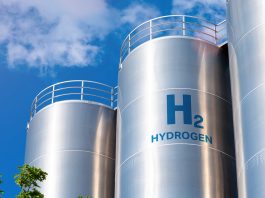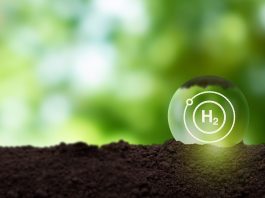Proteum Energy’s modular hydrogen production technology produces low and negative CI hydrogen leveraging unique feedstock values.
Steam methane reforming (SMR) is a process that has been used for decades for reforming natural gas into hydrogen.
The name ‘Proteum’ originates from the Latin word ‘proteus’ which borrows from ancient Greek mythology. The primary meaning of the word describes complex change, or reformation, and is similar to the word ‘protium’ for hydrogen. Proteum Energy® has developed, patented and trademarked a novel hydrogen production technology called Steam non-Methane Reforming (SnMR™). The hydrogen production technology reforms and enhances the environmental attributes of many non-methane and oxygenated hydrocarbon feedstocks.
Benefits of the SnMR process
The SnMR non-methane reforming process is more environmentally friendly than SMR because the reformation reaction requires less energy and water to reform varied feedstocks into hydrogen. With SnMR, methane is produced as a co-product with hydrogen, carbon dioxide and small traces of carbon monoxide. This also makes the SnMR hydrogen production technology particularly advantageous for the efficient removal of CO2 for sequestration, and the production of hydrogen and purity synthetic natural gas (SNG) from residue gas for the sales line, all at lower cost and CapEx per kilogram. Proteum Energy incorporated the novel SnMR hydrogen production technology into a modular platform solution based on well-known and industry-accepted shell and tube reactor designs, allowing for distributed deployment in regional markets. This hydrogen and designer fuel (HDF) platform allows for market versatility for regional production of hydrogen for fuel cell electric vehicles (FCEVs), hydrogen and methane blended designer fuels for low carbon intensity (CI) power generation (H2 gas to power), existing midstream gas plant enhancement with optionality for direct pipeline injection of hydrogen, and regional production of anhydrous ammonia for both fertiliser and fuel applications.
Using by-products of natural gas production
It is known that methane emissions contribute significantly to greenhouse gas emissions, which have a negative impact on the environment.
Ethane is often derived as an associated gas in natural gas production. When ethane cannot be readily sold for ethane cracking for the production of polyethene products, ethane is often ‘rejected’ by producers and midstream operators into natural gas pipelines to be sold solely for its heating value.
Proteum Energy takes advantage of excess residue gas and rejected ethane (or any associated gas) to be used as a feedstock to produce hydrogen and sequester CO2. This provides Proteum Energy production, or midstream gas processing, partners the opportunity to sell hydrogen through its various platform options. The producer has the ability to take advantage of regional transportation and fractionation price differentials, (the cost to producers for getting their products to sales terminals), allowing for regional profits from that same gas from derived hydrogen while, at the same time, obtaining a responsibly produced methane molecule that can be diverted directly to the natural gas sales line. Thus, the rejected ethane gets a ‘profitable detour’ through the production of hydrogen and sequestration of CO2 and parts of it will still end up as sold methane.
The SnMR hydrogen production technology is more efficient at producing hydrogen than traditional steam reforming methods and, with an oxygenated hydrocarbon feedstock like renewable ethanol, will produce high volumes of hydrogen and biogenic CO2. The Proteum Energy platform can be integrated directly into the ethanol producer’s plant, allowing the producer to sell hydrous 80-100 proof ethanol versus the 190-proof anhydrous and denatured final product. The ethanol producer gets the benefit of 20-30% of plant capacity product sales per year in the form of offtake, with the goal of replacing heavy-duty transportation diesel fuel with hydrogen fuel derived from ethanol. No longer does the ethanol producer have to rely on the blending of their product in gasoline motor fuel, especially as the growth of battery electric vehicles (BEVs) becomes more ubiquitous. In addition, the CO2 in ethanol comes from plant-based sources, is carbon-neutral, and the overall carbon footprint of the produced hydrogen can become negative when the CO2 is sequestered.
Proteum Energy has partnered with the University of Regina Clean Energy Technologies Research Institute (CETRI) to research and improve hydrogen yields, ensuring sustainable hydrogen production with the additional benefit of producing biogenic CO2 that can be sequestered, creating a negative carbon intensity hydrogen.
Transportation costs are a significant factor in the production and distribution of hydrogen. If hydrogen is produced in a large central facility, it must be transported long distances to reach its destination. Regional production facilities are located closer to end users and require less transport, which is both expensive for consumers and carbon-intensive for the environment.
Additionally, renewable ethanol is a liquid hydrogen carrier providing an efficient way to move hydrogen across regions. Proteum Energy’s modular hydrogen production technology, together with renewable ethanol, provides flexibility and lower capital expenditure (CapEx) and transportation cost per kilogram of hydrogen when located close to demand centres.
Anhydrous ammonia is a key component in the production of fertilisers. Traditionally, anhydrous ammonia is produced in large-scale centralised facilities, which requires the product to be transported over long distances to agricultural centres. This results in significant costs, safety concerns and greenhouse gas emissions. Proteum Energy’s regional and modular ammonia production supports the local community. It offers growers greater flexibility, enabling them to tailor their ammonia needs to specific crops, seasons, and soil types.
Proteum Energy currently has hydrogen production projects under review for both ethanol and fossil-based feedstocks. Plant sizes are 30 TPD of FCEV hydrogen in California, and 60-120 TPD of anhydrous ammonia in North Dakota. In addition, Proteum Energy has announced affiliations with partners in the UK and Europe with projects designed to reform residue gas from the North Sea into hydrogen, designer fuels, and ammonia.
Please note, this article will also appear in the fourteenth edition of our quarterly publication.









